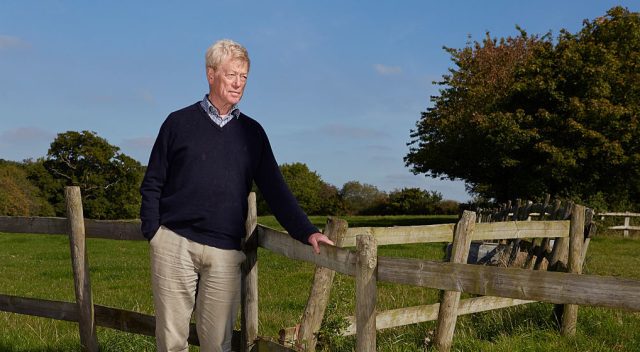Roger Scruton in 2015. Credit: Andy Hall/Getty Images

Roger Scruton gave Conservatism its head. He gave the movement the intellectual confidence to imagine a United Kingdom free from the European Union, and to fashion an appeal to the public based on their attachment to “the place which is theirs”.
In this, he also gave Conservatism its heart. I read The Meaning of Conservatism (1979) with some effort — rewarding, but hard work, like reading Oakeshott or Hayek. Scruton’s writings on music and aesthetics are beyond me; but his later popular work, crucially On Hunting (1998) and England: An Elegy (2000) got me in the guts. Scruton explained to me why I love my country.
On Hunting, is a pure delight. It is a deeply personal story of love and terror in the saddle (phrases have stuck: the sight of his future wife Sophie, “aloft in Beaufort colours”; the “stone teeth” of the dry-stone walls coming towards him “at the speed of the turning earth”). It is also the distillation of Conservatism, an account of the Hegelian experience in which the individual loses himself and finds himself among a community of fellows.
England: An Elegy, written in the cold dawn of the New Labour era, is provocatively nostalgic, written in the past tense, a “memorial address… to the civilisation that made me and which is now passing from the world.” Reading it now, you detect a self-mockery in the backward view. For surely Scruton’s philosophy is as current as ever. Today, 20 years after the book was published, we are seeing its fruit.
An old-new narrative is taking form in Conservatism, combining culture, place and community, with the particularly British spirit of enterprise and invention. Both halves of this combination resist a stifling central state, and the totalitarian impulse of the woke agenda; whether you want to live in a village or to start a tech business — or both, for doing both these things is now possible — you want economic and intellectual freedom, and you want to feel part of a tradition or a community that is bigger than you. This combination of freedom and belonging is the English inheritance Scruton explains to us; it is the inheritance we need for the future.
As a Wiltshire MP, albeit from the chalk downlands a few miles south of his clay country, I claim Roger Scruton for the county. He wrote at length (particularly News from Somewhere: On Settling [2004]) about its manners and its people, among whom he made his home, raised a family and became, as a foxhunter and bellringer, replete with function and with purpose.
Yet for all Scruton’s Aristotelian preference for the known and the vernacular, he was a Platonist too: he argued that England belongs to a universal European civilisation, to a classicism made gentle by Christianity and tempered by national feeling. His Anglicanism was properly catholic, which explains his own brave work behind the Iron Curtain, stoking the low fires of national identity during the long communist winter.
Just now, Conservatism has everything before it, but there are several paths ahead. It can take the easy one: follow the money and the zeitgeist; denigrate the past and embrace modernity; seek an accommodation with one of the sterile new powers of the world, America, Europe or China; further erase the particular character of the people.
Or it can take the harder path, through the thickets of metropolitan scorn. This means seeing people primarily as producers not as consumers, needing more purpose not more stuff; rooted in places, not mobile units of labour; capable of virtue, capable of sin. It means fashioning a particularly British model, independent of the great powers, based on a distinct conception of the British person as both free (free-thinking, bloody-minded) and attached (fond of home, and quietly deeply patriotic).
The British are tolerant and accommodating to strangers and strangeness because they know who they are, and are secure in the knowledge. Scruton showed in his own career how hard it can be to transmit this knowledge; but he did it, and perhaps in future it will be easier.
I interviewed Roger Scruton some 15 years ago for The Spectator. He said then, with a little bitterness, but not much, how he was entirely neglected by the Conservative Party. This continued, until the sudden surprising knighthood awarded by David Cameron, and then his appointment by Theresa May to the chair of the commission reviewing the future architecture of England.
These late honours were fitting, and one hopes are the harbingers of the judgements of the future. As Edmund Burke — famous but not revered in his own time — was to the 19th century, so should Scruton be to the 21st: the lodestar, from which all Conservative thought and action takes its bearings. His passing away, earlier than we might have hoped, comes yet at the end of a complete life. He fulfilled his purpose, to Wiltshire and the world.













Join the discussion
Join like minded readers that support our journalism by becoming a paid subscriber
To join the discussion in the comments, become a paid subscriber.
Join like minded readers that support our journalism, read unlimited articles and enjoy other subscriber-only benefits.
Subscribe